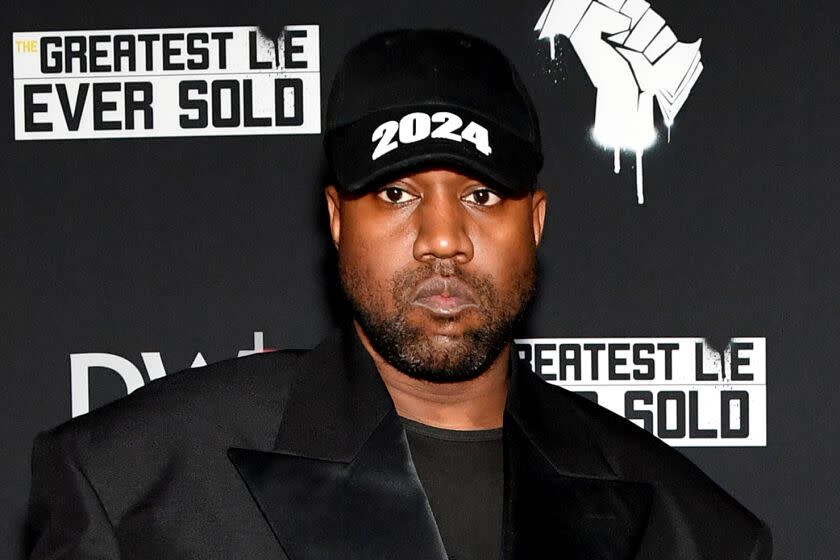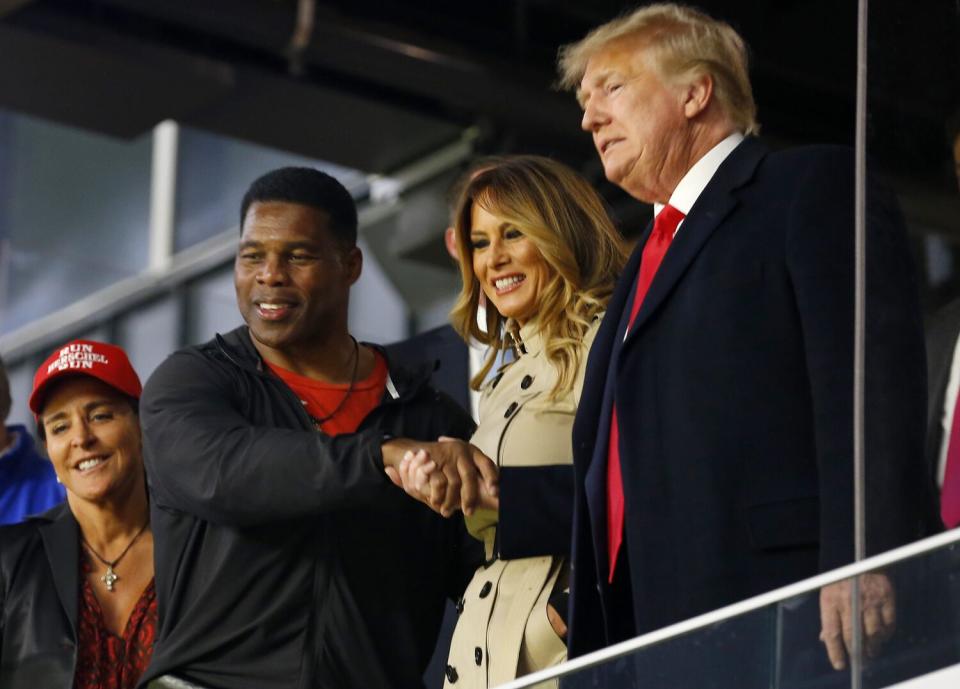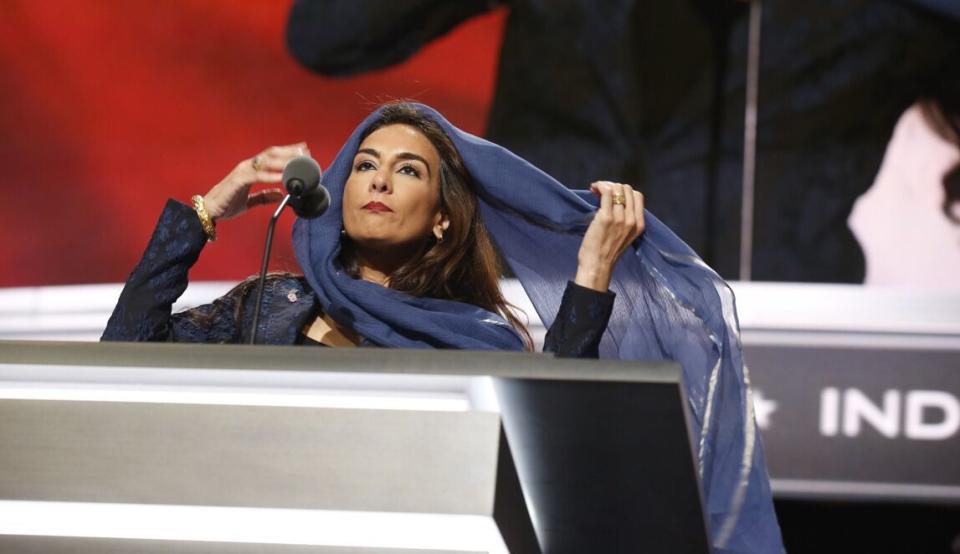Column: White supremacy comes in all colors. 2023 will make this impossible to ignore

- Oops!Something went wrong.Please try again later.
- Oops!Something went wrong.Please try again later.
- Oops!Something went wrong.Please try again later.
- Oops!Something went wrong.Please try again later.
- Oops!Something went wrong.Please try again later.
Kanye West. Nick Fuentes. Herschel Walker. Kyrie Irving. Enrique Tarrio.
If 2020 was the year that George Floyd's murder made us confront systemic racism and 2021 was the year that made us face right-wing terrorism, then 2022 was the year that blew up our collective assumptions about what extremism looks like in the United States.
Hate comes in all colors.
Columnists Erika D. Smith and Anita Chabria look back and look ahead to the new year, as antisemitic rhetoric and hate crimes continue to change our understanding of the way political turmoil crosses demographic lines.
Chabria: Erika, you and I have been talking for a while about how people of color find their way into conspiratorial, far-right movements.
Last year, you wrote about Larry Elder being the "Black face of white supremacy" when the talk radio show host ran for governor, hoping to replace Gavin Newsom. California voters overwhelmingly rejected Elder in that recall election. So were you surprised to hear Republicans of color from other states mimic his inflammatory rhetoric on the campaign trail in 2022?
Smith: Not really. It's depressing, but certainly not surprising.
During the recall election, I interviewed several Black Republicans in California, and many of them predicted that Elder's high-profile candidacy would encourage other conservatives of color to run for office. The only question was whether those conservatives would be moderate or whether they would emulate Elder, with his hard-line bombast and friendliness with far-right extremists, including Santa Monica native Stephen Miller.
Ultimately, I think what we saw in the midterm elections last year was a mixture of both.

On the one hand, Republicans managed to elect more Black members to Congress than at any point since the late 1800s — for what will be a total of five when new members are sworn in this month. Most are, at least on the surface, more restrained in their politics. On the other hand, the Black Republican candidate who drew the most attention in 2022 was Herschel Walker, an unabashed promoter of conspiracy theories and an inspiration for football-loving, white supremacists everywhere.
Walker thankfully lost his bid to replace Raphael Warnock, another Black man and a Democrat, as Georgia's junior senator. But it's telling that Republicans were so shameless about embracing him as some sort of mindless prop, supposed proof that their party couldn't possibly be racist since it had a Black man as a candidate.
But, I've got to say, when I think of people of color and extremism, the person who most comes to mind is Kanye West — or Ye, as I guess we're calling him these days. What did you think of him sporting that "White Lives Matter" T-shirt at Paris Fashion Week last year and descending into a series of antisemitic rants and conspiracy theories on TV? Oh, and having dinner at Mar-a-Lago with former President Trump and white supremacist podcaster Nick Fuentes?
Chabria: Ye is complicated. I think you have to ask loaded questions about mental health and exploitation. But ultimately, the reasons matter less than the result because of his far-reaching influence, which emboldened others. Case in point: Nazis dropping a banner off the 405 Freeway that read, "Kanye is right about the Jews."
Unfortunately, antisemitism is and always has been a great unifier for extremist movements.
Right now, what concerns me most is how antisemitism is entwined with the "great replacement" and "groomer" conspiracy theories that have become mainstream for conservatives. At the heart of a lot of these falsehoods is the belief that Jewish people are the instigators of whatever problem the theory is about, be it pedophilia or secret plots to overthrow white voters using election fraud.

What those theories also have in common — and what's relevant to understanding people of color embracing extremism — is that they all purport to be about protecting the traditional family structure. And by that I mean straight men in power and women happily subservient to their alpha males. That's a seductive world view for a certain type of guy, regardless of race. It uses Christianity as its justification, melding the whole mess with Christian nationalism. There's a lot of overlap in these ideologies, and a lot of flexibility.
I've seen this firsthand with the Proud Boys, some of whom, like their leader, Enrique Tarrio, are Latino, especially in the Central Valley. Over the last few years, they've turned out in increasing numbers at antiabortion rallies. Now they have an organized campaign against transgender people, centering on drag shows.
When I hear them talk, it's often with this grievance-driven narrative: That liberalism is attempting to destroy their masculinity, and they must protect their children from the same fate. That can encompass rejecting vaccines, requiring women to carry unwanted pregnancies or stopping gender nonconformity.
That righteous warrior bit is nothing new, but it's powerful bait for luring others into extremism, and it crosses a lot of demographic and geographic lines. And to be clear, just like white supremacy can co-opt people of color, misogyny can lure plenty of women who support those views of masculinity and family.
But I think some people still see that kind of extremism as different from white supremacy. What do you think?
Smith: I'd have to agree. At this point, I actually think the definitions of "extremism" and "white supremacy" are completely muddled.
When most Americans hear those terms, my guess is they envision what they saw on Jan. 6, 2021, with mostly white men and women in MAGA gear and military fatigues, brazenly sacking the U.S. Capitol. Or maybe the racist, hateful rhetoric spewed by Trump and his many Republican acolytes who remain in Congress.
But someone like Ye? While he has been problematic for years — remember his "slavery was a choice" comment? — he also is a Grammy-winning rapper who was performing sold-out shows as recently as February of last year.
Same with Brooklyn Nets star Kyrie Irving, who posted a link on social media to a movie rife with antisemitism, and initially refused to apologize for it. Six months ago, I could've bought his Nike-branded basketball shoes and probably still can on a discount rack somewhere.

That disconnect? That tendency among some to rationalize and make excuses for celebrities of color, instead of immediately acknowledging that they are sharing dangerous conspiracy theories and having an honest conversation about why. That's how the mainstreaming of extremism happens. That has to change in 2023.
Then there's white supremacy. I got a lot of grief when I wrote that Elder was the Black face of it. "How," hundreds of readers asked me in emails sprinkled with the N-word, "can someone be a Black white supremacist?" Simple. White supremacy is an ideology, a hierarchy of racial power that has been an integral part of this country since its founding, whether Americans want to acknowledge it or not.
Anyone of any race can be a prop, a tool or an enabler of white supremacy — and there have always been volunteers, because proximity to whiteness often pays. That's not to say people of color are a monolith of left-leaning political affiliation. There have always been Black and Latino conservatives, for example.
But as Republicans continue their quest for non-white candidates and influencers, hoping to prove — usually in the most superficial ways — that their party isn't racist, the people who are making money off this divisiveness are increasingly out in the open. 2023 will make this impossible to ignore.
Speaking of quests, can we talk for a moment about California attorney Harmeet Dhillon running to be chair of the Republican National Committee?
Chabria: I'm mixed-race, South Asian and the daughter of an immigrant — similar to Dhillon, whose parents emigrated from India.
Indian culture is conservative and shares more in common with American Evangelism than liberalism, especially on issues such as abortion. It also has deep roots of anti-Blackness; for centuries, dark-skinned Indians have been discriminated against. So finding a Trump-supporting South Asian isn't surprising — I've got dozens in my family.
But Dhillon has taken her MAGA obsession next level, as our colleague Mark Barabak explained recently. She has long pushed the idea, in the court of public opinion and in actual courts, that our elections are rife with fraud, which is untrue.
If she's elected chair this month, it almost guarantees future claims of rigged voting. She has helped failed Arizona gubernatorial candidate Kari Lake, a Trump Republican, try to contest her loss in court.

Personally, I see in Dhillon what you see in Ye — someone benefiting from proximity to whiteness who will ultimately be unpleasantly surprised. Extremists might play nice with people of color along the way, but they will have little need for equality or even tolerance if they solidify power.
But if there is anything hopeful in our growing exposure to extremism, it's that those of us who don't buy into it see it for what it is. You said that well, that we can't just call it out, we have to continue to understand the roots of it to create change.
We see that in the painful reckoning happening in L.A. over that racist City Hall recording, involving three members of the City Council and a labor leader. At heart, that was Latino politicians — Democrats, at that — plotting against Black voters. That's been called out as being part of a divisive power structure that younger generations reject.
Even just a few years ago, there was a hesitancy to confront any kind of racism that wasn't about white oppression of others. 2022 put an end to that, and that's a good thing.
Extremists don't get to own what it means to be an American, or a patriot. The more we challenge hate, regardless of who is spewing it, the more we are able to find our commonalities and the shared values that this country should stand for, eventually, someday.
Is there anything that gives you hope in this fight?
Smith: Well, extremism sure doesn't show any signs of slowing down.
Not only is Trump running for president, doubling down on his white supremacist platform, but apparently Ye is too. Meanwhile, the Jewish Federation of Greater Los Angeles has grown so unnerved by the rise in antisemitism that it recently launched a citywide billboard campaign to counter hate speech.
But, like you said, the fact that we're talking about this stuff at all is cause for optimism. I just hope the conversations can continue in 2023. Here's to a happier new year!
This story originally appeared in Los Angeles Times.
